All of Brita’s water filters do a great job at removing most flavors and odors from water. On their website, Brita indicates that all of their filters remove taste and odor caused by chlorine. They note that chlorine, particulates, and zinc are the source of many of the odors you may find in your water. Brita’s filters use a combination of activated carbon and an ion exchange resin to remove these odor-causing impurities from your drinking water.
In this article, we discuss the various odors you may have in your water and whether Brita filters can remove them. We also cover what causes odors in your water and the treatment methods that remove them. Continue reading to learn more about this interesting topic.
Table of Contents
Odors in My Drinking Water
The water we drink comes from many different sources including rivers, lakes, streams, and underground aquifers. Water taken from these various supplies can pick up different minerals, compounds, and bacteria that may cause it to have an odor.
Public water supplies treat the water to disinfect it and remove impurities. These processes also add chemicals to the water that may cause it to have an odor. The following sections outline some of the common odors you may find in your water and their potential causes.
Rotten egg smell
A rotten egg smell in your water is usually caused by the presence of hydrogen sulfide gas. This odorless gas is produced when water comes into contact with decaying organic matter, such as plant material, algae, or bacteria. The gas dissolves easily in water and is often found in well water.

While the smell is off-putting, it’s not harmful. Usually, this problem is limited to private wells.
The most effective way to eliminate the rotten egg smell is to install either an aeration system or an activated carbon filter. Both of these treatment methods will remove the hydrogen sulfide from your water.
Brita filters use activated carbon as a treatment method. This means that Brita filters will remove the rotten egg smell from your water.
Fish odor
The fishy smell in your drinking water is most likely caused by organic material that has made its way into your water source. Chloramines, barium, and cadmium are common contaminants that can cause a fishy smell in your water.

Reverse osmosis systems, ion exchange and carbon filters are the most effective ways to remove contaminants from your water supply and improve the odor and taste of your drinking water.
Brita uses activated carbon in all of their treatments. Therefore, all Brita filters will remove the rotten egg smell from your drinking water.
Earthy and musty smell
The musty, earthy smell often accompanying hot water is likely due to iron bacteria. Iron bacteria grow in water when iron and oxygen are present. The bacteria can grow rapidly under these conditions, creating a slime that emits an unpleasant odor.
Chlorination systems can effectively reduce the bacteria which will eliminate the odor. Activated carbon filters can remove the biological particles from the iron bacteria to reduce the odor.
Brita filters use activated carbon and would be expected to remove earth and musty smells from water.
Fuel fumes
If your water supply has a fuel odor, then it has likely been contaminated with gasoline, diesel, or fuel oil. These contaminants can enter the water through leaks in underground storage tanks or pipelines.
The only way to effectively remove these contaminants is to install an activated carbon filter. Brita’s filters use activated carbon, which means they will remove fuel fumes from your drinking water.
Bleach or swimming pool smell
Municipal water supplies add chlorine or chloramine to disinfect the water. This can cause your drinking water to have a bleach or swimming pool smell.
There are several methods that can be used to remove chlorine from your drinking water including reverse osmosis, activated carbon filters, and ion-exchange systems.
All Brita filters use activated carbon to remove chlorine from water. This means that all Brita filters will remove the bleach or swimming pool smell from your drinking water.
Brita notes on their website that all of their filter products remove taste and odor from chlorine.
Concerns with Odors
Generally speaking, odors are a nuisance and do not pose a health concern. Some odors, such as fuel fumes, pose a health risk and should be addressed immediately.
Nuisance odors
Odors that are unpleasant but not a health risk include:
- rotten egg smell
- musty/earth smell
- fishy smell
- chemical/swimming pool
Odors that indicate a health concern
If you have a fuel odor in your drinking water, you have a serious problem. The cause of this issue is likely contamination from gasoline, diesel, or fuel oil. If you have a fuel odor in your water, you should stop using it immediately and have it tested by a professional as these contaminants can be harmful.
Drinking water standard for odors
The US Environmental Protection Agency (EPA) establishes maximum contaminant levels (MCLs) for drinking water. The MCL is the highest level of a contaminant that is allowed in drinking water.
Here is a summary of the EPA’s drinking water standards for common odor causing contaminants.
- hydrogen sulfide: The EPA’s current drinking water standards do not include hydrogen sulfide as a primary contaminant or a secondary contaminant.
- chloramine: There is no MCL for chloramine, however there is a MRDL (maximum residual disinfectant level) of 4.0 mg/L for chloramines as Cl2.
- barium: The EPA established an MCL of 4 mg/L for barium.
- cadmium: The MCL for cadmium in drinking water is 0.005 mg/L.
- taste and odor: No MCL has been established for taste and odor. However, the EPA does have secondary maximum contaminant levels (SMCLs) for taste and odor in drinking water.
The National Secondary Drinking Water Regulations are non-enforceable guidelines regarding contaminants that may cause cosmetic effects (such as skin or tooth discoloration) and aesthetic qualities such as taste, odor color in your drinking water. The EPA has established a secondary Maximum Contaminant Level for odor – this level only applies to public water supplies, not private wells.
The US standard for odor is 3 Threshold Odor Numbers (TON). TON values are determined by diluting a water sample until you obtain a just-detectable odor. For a value of 3 TON, you would have to dilute your smelly water 3 times.
Brita Filters and Odor Removal
Brita filters all contain activated carbon, which is effective at removing many common water odors. The type of Brita filter you need depends on the kind of odor you are trying to remove from your water.
How well do Brita filters remove odors
In general, Brita filters do a good job of removing odor from drinking water. The performance of the filters depends on the cause of the odor.
Brita’s filters were initially designed to remove odors and taste from chlorinated water. If your water smells like a swimming pool, then your Brita filter will do a great job.
Brita filters can remove the following odors and smells from water:
- chemical or swimming pool smell from chlorine
- fuel fumes from gasoline, diesel or fuel oil
- earthy or musty smells from iron reducing bacteria
- fishy smells caused by chloramines
Other odors are more difficult to treat. This is because they are often caused by dissolved minerals in the water. For example, the fishy smell from barium or cadmium won’t be removed by a Brita filter.
Learn more about Brita filters and the contaminants they can remove from drinking water.
Brita claims about odors

Brita makes several claims about odors on their website.
Odors from chlorine. Brita indicates that all of their filters can remove taste and odor cause by chlorine.
Odors from zinc. Brita claims that their Standard filters can remove zinc. Zinc is known to cause odors in drinking water.
Odors from particulates. Brita claims that their Elite and Faucet Mount filters can remove particulates. Particulates cause a wide range of odors in water.
PUR filters can remove odors from water, too.
Testing for Odors
Even though odor-free water is not necessarily safe to drink, the presence of odors and tastes are useful indicators of water quality. Odor may also reveal the efficacy of various treatment methods.
Currently, most methods for measuring taste and odor are fairly subjective. There are no universally accepted methods for taste and odor, and more research is required. One particular challenge with odor testing is that some contaminant odors are noticeable even when present in extremely low concentrations. Not only is it difficult to identify the source of the odor, but it can also be expensive to do so.
Brita Product Summary
Brita has an extensive line of filtration products to meet your water treatment needs. Their filters include:
- Pitcher filters
- Faucet filters
- Bottle filters
- Dispenser filters
- Replacement filters
Brita pitcher filters
Brita has 12 pitcher filter models available. They come in capacities ranging from 6 to 12 cups, a variety of features, and many color options.
Depending on which pitcher filter you have, you can choose between three different replaceable filters. I have a review and summary of them in the section below.
Features you may want to consider include:
- Autofill lid – Pitchers with autofill lid option don’t have a lid, so you don’t have to lift it up to fill the reservoir.
- Easy-fill lid – Similar to autofill lids, pitchers with this option don’t have a lid to lift up.
- Electronic filter indicator – The filter indicator lets you know when it’s time to replace a spent filter. It is activated when the lid opens for 5-8 seconds (based on size of reservoir) and measures how much water has been treated by keeping count of the number of times it’s filled.
- Filter-As-You-Pour technology – This innovation eliminates the need for a reservoir, so you have instant access to treated water without having to wait for the entire pitcher volume to be treated.
- Locking lid – This cap prevents dust and debris from falling into the filter reservoir.
- Smart Light filter indicator – This indicator records the amount of water flowing out of the pitcher when the jug is tilted during usage. It has a green, yellow, and red indicating light to let you know how much filtration capacity is left.
Here is a summary of Brita’s current filter pitchers and their key features.
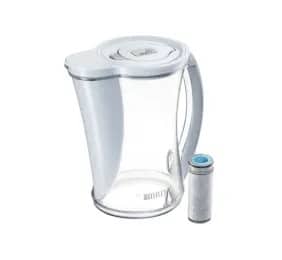
Cascade Stream Water Pitcher
Average price: $34.49
Capacity: 12-cup
Colors: White, Maroon
Features: Electronic filter indicator, Filter-As-You-Pour™ technology
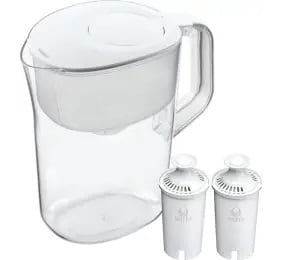
Champlain Water Pitcher
Average price: $36.99
Capacity: 10-cup
Colors: White
Features: Smart Light filter indicator
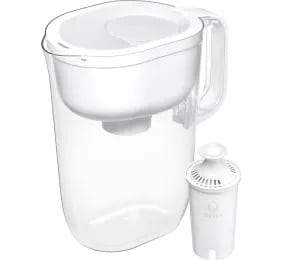
Huron Water Pitcher
Average price: $41.99
Capacity: 10-cup
Colors: White, Teal, Black, Red
Features: Smart Light filter indicator
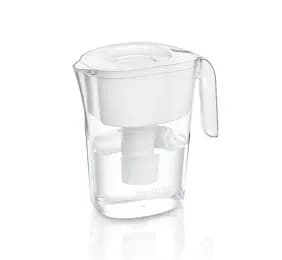
Lake Water Pitcher
Average price: $36.99
Capacity: 10-cup
Colors: White, Blue
Features: Electronic filter indicator, Autofill lid
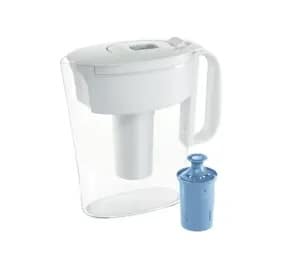
Metro Pitcher
Average price: $21.99 to $32.99
Capacity: 6-cup
Colors: White, Red, Turquoise
Features: Electronic filter indicator, Space-efficient design
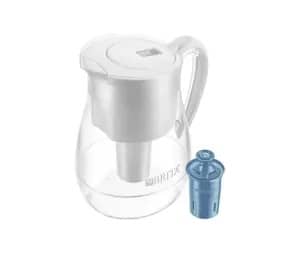
Monterey Water Pitcher
Average price: $41.99
Capacity: 10-cup
Colors: White, Blue, Black, Green
Features: Electronic filter indicator, Easy-fill lid
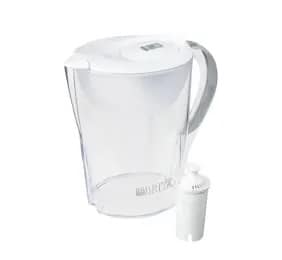
Pacifica Water Pitcher
Average price: $36.99
Capacity: 10-cup
Colors: White, Red, Black
Features: Electronic filter indicator, Easy-fill, locking lid
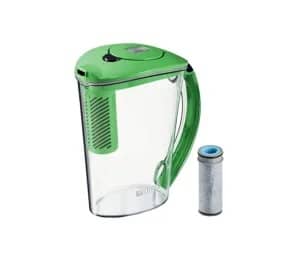
Rapids Stream Water Pitcher
Average price: $32.49
Capacity: 10-cup
Colors: Aquamarine, Grey
Features: Electronic filter indicator, Filter-As-You-Pour™ technology

SoHo Water Pitcher
Average price: $21.99
Capacity: 6-cup
Colors: White, Red, Black
Features: Electronic filter indicator, Space-efficient design
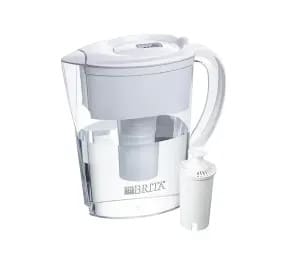
Space Saver Water Pitcher
Average price: $22.99
Capacity: 6-cup
Colors: White, Blue, Red, Black
Features: Electronic filter indicator
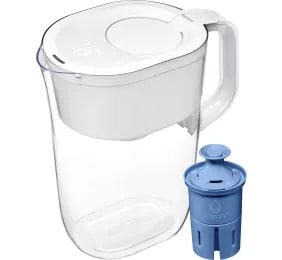
Tahoe Water Pitcher
Average price: $36.99 – $41.99
Capacity: 10-cup
Colors: White, Blue, Black, Green
Features: SmartLight filter indicator

Wave Water Pitcher
Average price: $36.99
Capacity: 10-cup
Colors: White
Features: Electronic filter indicator, Locking lid
Brita Faucet Filters
Brita has a line of faucet filters that you can install on your kitchen or bathroom faucet to provide clean drinking water.
There are two main models of Brita faucet filters with different features:
- Basic Water Filter Faucet System – This filter attaches onto any standard faucet. Itt comes with one 100-gallon filter which removes 99% lead from tap waters making them safe for drinking or cooking. It also reduces chlorine (taste/odor), benzene, asbestos, and trichloroethylene concentrations.
- Complete Water Filter Faucet System – This system attaches easily to your sink faucet and includes two 100 gallon filters. These filters remove 99% of lead as well as chlorine (taste/odor), benzene, asbestos, and trichloroethylene.
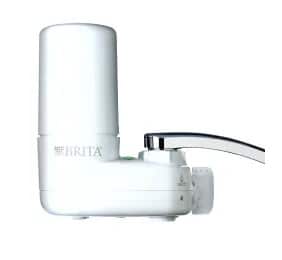
Basic Water Filter Faucet System
Average price: $19.99
Treatment capacity: 100 gallons
Contaminant removal: lead, chlorine (taste & odor)
Features: Filter replacement indicator
Colors: white, chrome
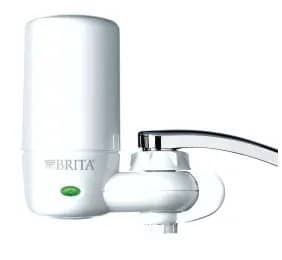
Complete Water Filter Faucet System
Average price: $19.99
Treatment capacity: 100 gallons
Contaminant removal: chlorine (taste & odor)
Features: Electronic filter indicator, 3 spray options
Colors: white
Brita Dispenser Filters
Brita has a line of dispenser filters that are designed to sit on your countertop and provide clean, filtered water for you and your family.
There are two main models of Brita dispenser filters:
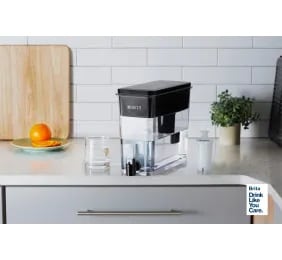
Ultramax Water Dispenser
Average price: $38.99 to $49.99
Treatment capacity: 27-cups
Features: Electronic filter replacement indicator
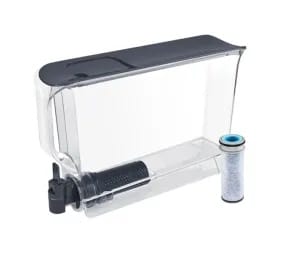
Ultraslim Stream Water Dispenser
Average price: $44.99
Treatment capacity: 25-cups
Features: Smart Light filter indicator (including auto-reset feature), Filter-As-You-Pour technology
Brita filter elements
Brita has replaceable filter elements for all of the water treatment products. The pitcher filters and Dispenser filters can use either the Elite or Standard filters.
Here is a description of the filter elements the Brita offers including pricing, capacity, service life, and other important information.

Elite filters
Average price: $19.99
Treatment capacity: 120 gallons
Service life: 6 months
Contaminant removal: removes 99% of lead; chlorine (taste & odor)
Pitcher compatibility: Fits all Brita pitchers and dispensers (except Stream)
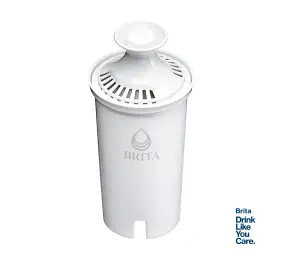
Standard filters
Average price: $7.99
Treatment capacity: 40 gallons
Service life: 2 months
Contaminant removal: chlorine (taste & odor)
Pitcher compatibility: Fits all Brita pitchers and dispensers
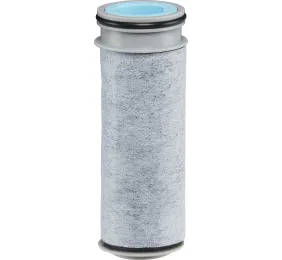
Stream filters
Average price: $7.99
Treatment capacity: 40 gallons
Service life: 2 months
Contaminant removal: chlorine (taste & odor)
Pitcher compatibility: Fits all Brita Stream pitchers and dispensers
Features: Filter-As-You-Pour technology
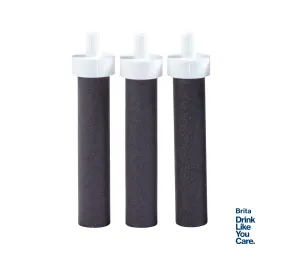
Water bottle filters
Average price: $14.99
Treatment capacity: 40 gallons
Service life: 2 months
Contaminant removal: chlorine (taste & odor)
Pitcher compatibility: Fits all Brita Premium Filtering Water Bottles
How do you replace a spent Brita filter and install a new one?
The Standard Brita pitcher filter should be replaced every two months or 40 gallons, whichever comes first. Elite filters are replaced after treating 100 gallons or every six months.
To replace your filter:
- Rinse your Brita Standard Filter with cold water for 15 seconds.
- Insert the filter into the reservoir by lining up the groove in the filter with the ridge in the reservoir. Press firmly for a tight seal.
- Add cold tap water. Discard your first three pitchers of filtered water or use it to water plants. It’s normal for carbon dust to appear in your first few fillings.
Brita Filter Maintenance
Britia filters have a consumable filter element that needs to be replaced every 100 gallons or about every four months. The frequency of replacement will depend on the specific filter you have and how much water you use.
It is important to follow the manufacturer’s instructions for replacing the filter. This will ensure your Brita filter continues to work properly.
How often do I need to replace my Brita filter
Each model of Brita filter has a recommended service life. Brita’s recommendations are summarized in the following table.
| Model | Volume of Water | Time |
| Longlast+ | 120 gallons | 6 months |
| Longlast | 100 gallons | 4 months |
| Standard Brita pitcher filter | 100 gallons | 4 months |
| Faucet filter | 100 gallons | 4 months |
Overview of Brita Filters
Brita filters are a type of pitcher filter that uses particle filtration and activated carbon adsorption to remove contaminants from drinking water. Activated carbon is a very effective treatment method for removing a wide variety of contaminant, including glyphosate, from water.
How they work
Brita filters include sediment filters and granular activated to purify drinking water. The activated carbon in the filters adsorbs a wide range of contaminants such as VOCs, solvents, herbicides, and pesticides from the water.
Water is poured into the pitcher reservoir where it flows via gravity through the filters. The contaminants are adsorbed to the activated carbon in the filters and the clean water is collected in the pitcher.
NSF certification
NSF International is an independent organization that tests and certifies products to ensure they meet safety and performance standards. Several Brita filters are certified by NSF to remove a wide range of contaminants from drinking water, including VOCs, solvents, herbicides, and pesticides.
NSF certification is a great way to confirm the claims made by equipment manufacturers. NSF conducts testing in accordance with strict protocols and issues certifications to products that meet their standards.
Final Take on Brita Filters and Odors
If you’re looking for a way to remove odors from your drinking water, Brita filters are a good option. They are designed to remove many common water odors, and they are NSF certified. However, keep in mind that they will not remove all odors, and some may be difficult to treat. Be sure to follow the manufacturer’s instructions for filter replacement and maintenance.
Do you have experience with Brita filters and odors? Let us know in the comments below.

